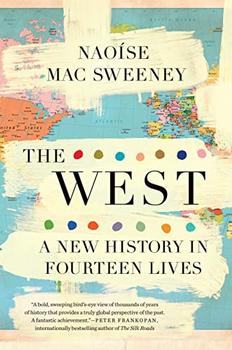Summary | Excerpt | Reviews | Beyond the Book | Readalikes | Genres & Themes | Author Bio

A New History in Fourteen Lives
by Naoíse Mac SweeneyIntroduction
THE IMPORTANCE OF ORIGINS
Origins matter. When we pose the question, "Where do you come from?" what we are really asking is often, "Who are you?" This is true for individuals, families and entire countries. It is also true of an entity as large and as complex as the West. This intersection between origins and identity lies at the heart of the culture wars that are currently rocking the West. The last decade has seen the toxic polarisation of political discourse, the toppling of statues and the undermining of elections by incumbent heads of state. The identity crisis within the West is largely a response to wider global patterns. The world is changing, and the foundations of Western dominance are being shaken. In this historical moment we have the chance to radically rethink the West and to remake it anew for a better future. But we can do this only if we are willing to confront its past. Only by answering the question of where the West comes from can we answer the question of what the West could and should be.
The term "the West" can refer to a geopolitical alignment or a cultural community, usually designating a set of modern nation-states sharing both cultural features and political and economic principles. Amongst these are ideals of representative democracy and market capitalism, a notionally secular state overlying a Judeo-Christian moral substratum, and a psychological tendency towards individualism. Nothing on this list is exclusive to the West or universal across it, yet the regular occurrence of all or most of these attributes together is nonetheless characteristic. The same can be said of many of the more clichéd symbols of westernisation – champagne and Coca-Cola, opera houses and shopping malls. But one particular defining feature of the West is the notion of a common origin resulting in a shared history, a shared heritage and a shared identity. The origin myth of the West imagines Western history as unfurling back unbroken in time through Atlantic modernity and the European Enlightenment; back through the brightness of the Renaissance and the darkness of the Middle Ages; back, ultimately, to its origin in the classical worlds of Rome and Greece. This has become the standard version of Western history, both canonical and clichéd. But it is wrong. It is a version of Western history that is both factually incorrect and ideologically driven – a grand narrative that constructs Western history as a thread running singular and unbroken from Plato to NATO, and that is usually referred to by the handy shorthand term "Western Civilisation". .
Just to avoid any confusion, this is not a book about the rise of the West as a cultural or political entity. There are a great many books on that subject already, offering a variety of explanations for how the West achieved global dominance. Instead, this book charts the rise of one particular version of Western history, a version that is now so widely perpetuated and deeply ingrained that it is often accepted unthinkingly, and yet is both morally problematic and factually wrong. This book unpicks and unpacks the grand narrative known as "Western Civilisation".
This version of Western history – the grand narrative of Western Civilisation – is all around us. I remember when I became truly conscious of quite how deeply entrenched it was. I was in the reading room of the Library of Congress in Washington, DC. Looking up by chance at the ceiling I realised uncomfortably that I was being watched, not by the ever-vigilant librarians, but by sixteen life-size bronze statues standing on the gallery beneath the gilded dome. From antiquity there were Moses, Homer, Solon, Herodotus, Plato and St Paul. From the old world of Europe there were Columbus, Michelangelo, Bacon, Shakespeare, Newton, Beethoven and the historian Edward Gibbon. And from the New World of North America there were the jurist James Kent, the engineer Robert Fulton and the scientist Joseph Henry. I realised in that instant that the entire set-up of the room (not just the statues but also the murals that decorated the walls and even the organisation of the bookshelves) was designed to emphasise one thing – that we at the desks were part of an intellectual and cultural tradition that stretched back though the millennia. And our forebears in that tradition were literally watching over us, perhaps in encouragement, perhaps in judgement, as we worked.
Excerpted from The West by Naoíse Mac Sweeney. Copyright © 2023 by Naoíse Mac Sweeney. Excerpted by permission of Dutton. All rights reserved. No part of this excerpt may be reproduced or reprinted without permission in writing from the publisher.
Your guide toexceptional books
BookBrowse seeks out and recommends the best in contemporary fiction and nonfiction—books that not only engage and entertain but also deepen our understanding of ourselves and the world around us.